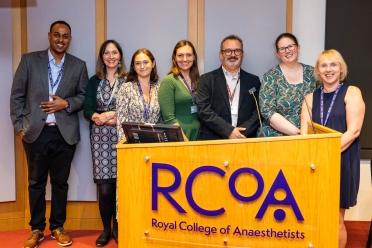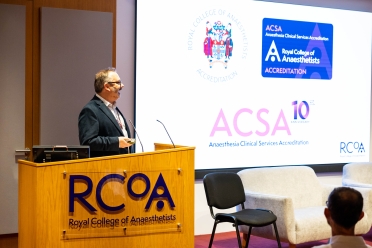ACSA Annual Forum 2025
On 9 July 2025, we held an event bringing together ACSA departments and reviewers. We asked members of the ACSA committee, ACSA leads of recently accredited or reaccredited departments and experienced ACSA reviewers to speak on their experiences with ACSA. There were lectures on the new 2025 standards, the importance of involving Anaesthetists in training and on upcoming improvements to the ACSA portal, as well as a difficult standards workshop and an open forum for questions.
On this page you can find the recordings of the day's lectures and the slideshow, which we hope will be helpful to both ACSA leads and ACSA reviewers.
We will be holding an event annually for leads and reviewers. The next event date will be published here as soon as it is confirmed.
Please note that the 2025 standards have been updated since the talk given by Dr Adrian Jennings. The slides available for download at the bottom of this page have been updated to avoid confusion, and the new standards which have been added to the 2025 iteration are printed below. You can find the full 2025 standards document on this page, along with the excel version and the summary of changes document.
The newly added standards are:
- 1.2.1.7 - Where appropriate, anaesthetists contribute to MDT discussions within relevant patient pathways.
- 1.2.1.8 - Guidelines are in place for the prevention and management of postoperative cognitive dysfunction and postoperative delirium.
- 1.2.1.9 - Policies are in place for the management of perioperative allergy, including referrals to allergy clinics where appropriate.
- 2.1.1.18 - Specialised monitoring and equipment appropriate to the surgery undertaken is available with staff who are trained and competent to use it. This is adequately maintained.
- 4.3.3.6 - Anaesthetic provision for elective sub-specialist surgery is delivered by a group of consultant or autonomously practising anaesthetists who maintain current competency in that subspecialty area.
- 4.3.3.7 - Those consultants or autonomously practising anaesthetists who provide emergency cover to sub-specialty clinical areas but who do not undertake regular anaesthetic practice in that sub-specialty have time to attend appropriate CPD and attend sub-specialty surgery lists in a supernumerary capacity.
- 4.3.3.8 - The department has processes in place to regularly review Specialist, Specialty, Locally Employed Doctor and Fellow posts, to ensure that they best support the individual and contribute to career progression.
- 4.3.3.9 - All anaesthetists within the department (including Specialists, Specialty, Locally Employed Doctors and Fellows) should be provided with the support to enable career development. This should include, but is not limited to, educational supervision, pastoral care and access to study leave.
The agenda for the day is below. If you want to watch a specific session, please go to the timestamps indicated. The PowerPoint slides are available to download at the bottom of this page.
| Time in video | Session |
|---|---|
|
Session 1 0:00 |
Welcome and Introduction Dr Jon Chambers, ACSA chair and clinical lead |
|
Session 1 11.55 |
2025 ACSA Standards: Key Changes and Domain 5 Integration Dr Adrian Jennings, Russells Hall Hospital, Dudley & Dr Nick Spittle, Chesterfield Royal Hospital |
|
Session 1 47.30 |
The new ACSA Standard on Perioperative Allergy Dr Amy Dodd, North Bristol NHS Trust |
|
Session 2 0.00 |
ACSA Updates: What’s new on the portal Ms Ruth Nichols, Head of Clinical Quality |
|
Session 2 08.35 |
Involving anaesthetists in training in the ACSA review process Dr Tallulah Boddy, Royal Cornwall Hospitals NHS Foundation Trust |
|
Session 2 32.00 |
A Lay Reviewers’ Perspective Mr Stuart Burgess, ACSA Lay Reviewer |
|
Session 2 52.20 |
Preparing for ACSA: Tips, pitfalls and helpful hints Dr Maria Garside & Dr Sarah Goellner, Bradford Teaching Hospitals NHS Foundation Trust |
|
Tricky Standards Workshop Dr Kate Glennon, ACSA Committee Vice Chair **This workshop took place in breakout rooms, which were not recorded** |
|
|
Session 3 0.00 |
Q+A with all speakers Chaired by Dr Jon Chambers, ACSA chair and clinical lead |

The ACSA team
Mohamoud Ali, Dr Kate Glennon, Ruby Lucas, Daisy Rai, Dr Jon Chambers and Ruth Nichols

Dr Chambers
Dr Jon Chambers introduces the ACSA scheme

Difficult standards workshop
Delegates discuss how they would rate examples against the ACSA standards
